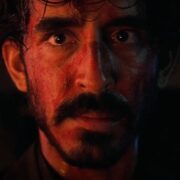The Nominated Film You May Have Missed: DEAD POETS SOCIETY
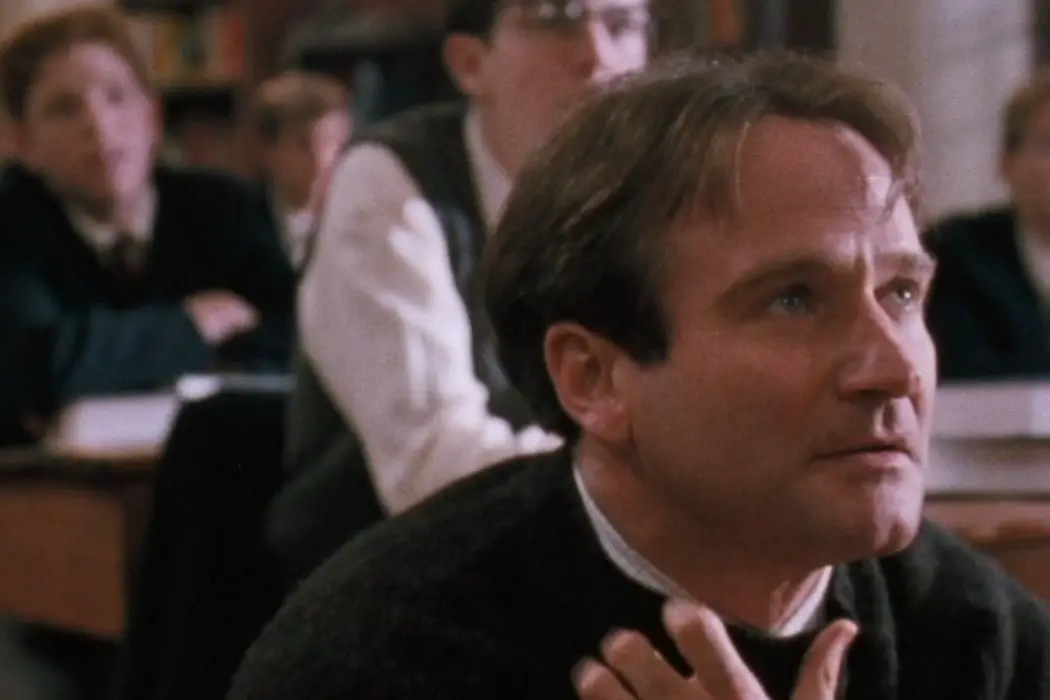
Stephanie Archer is 39 year old film fanatic living in…
Every year, between five to ten movies are bestowed the honor of being nominated by the Academy of Arts and Sciences. Many will have already enjoyed various successes throughout the year – good festival attendance, box office success and the reception of other prestigious awards. Yet, only one of them ends their evening declared the best of the best.
Each month, I select one such film that while honored with a nomination, did not achieve the highest recognition – a film for your consideration. Bringing these films back into the spotlight and into the minds of viewers gives them the chance to shine once again and reach a new group of people who may never have considered them previously. This month, with the holiday season just ending and the coldest nights of winter still to come, I found inspiration in the thought of family and warmth.
Every holiday, when my family and I are able to be together, it is a cherished and unspoken tradition for all to culminate at the end of the day to watch movies as a family. We are a big movie family in general, but no matter what film is selected for viewing – we always watch it together. With this in mind, I wanted to select a film that would be perfect for the entire family. Enter Dead Poets Society.
A heartwarming and wholesome story, Dead Poets Society is a coming-of-age tale that follows a young group of preparatory school boys in the early years of the rest of their lives. Everything has been planned out for them, and through honor, discipline, tradition and excellence they can achieve greatness. Yet, in an environment where conformity and obedience is the key to life, a sacrifice of self must be made for the future and for the family – yet the question being how much of yourself are you willing to give to a preconceived future.
Dead Poets Society
Each year, Welton Preparatory Boys School begins with a ritual to remind returning students and new arrivals of the foundations with which the school is built on – honor, discipline, tradition, and excellence – and where their dedication to these principles will lead them. The stuffy, crowded stone building in which they gather airs the level of success and expectation of the students, and the gathering of their parents, who proudly look on, only enforces this mantra.
Tradition is the strongest principle immediately drilled into the minds of viewers (and students!) as traditional flags and bagpipes are paraded ahead of the teachers, who will instill the future into these boys, and candles are lit one by one to signify the light of knowledge. While ritualistic and stifling, this is only the beginning.
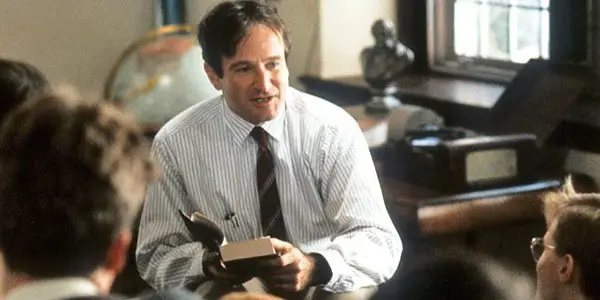
Following the school’s annual ceremony, the boys are whisked away from their parents, long drawn out goodbyes frowned upon. One boy, Neil (Robert Sean Leonard – best known for starring as Dr. Wilson in House) has a moment with his father, though not a touching one. He is reminded of the schoolwork he has done over the summer, the expectations of success for the upcoming year, and dictated what extracurricular activities he may and may not participate in. Reminded he is to become a doctor, Neil succumbs to his father’s wishes, sacrificing his participation in the school yearbook for further in-depth studies.
The boys around Neil follow the same rigorous pattern as they begin their classes the following day – each barely unpacked when they begin planning study groups between them. The expectations on all are high, the workload unimaginable and the fear of failure unbearable. Yet, their entire regimented workload comes to a grinding halt with the beginning of English class and the entrance of a new teacher and former graduate himself – John Keating (Robin Williams).
Mr. Keating immediately dives head first into breaking the mold of education and learning. Instructing the boys to rip out the monotonous and unimaginative introduction to their text on poetry, Keating begins to tear out the pages in their lives of a book that was already written for them before they were born. In this one moment, the love, loss, and hardships of the future the boys are set to face are given not a one way path to success but instead a chance to see the world with new eyes, new possibilities, and new beliefs.
Breaking Tradition
Dead Poets Society in a coming-of-age tale set in a restrictive environment that examines the potential harmful effects on children who are forced to conform to the constraints of school, society, their parents and expectations of their futures. This is not the first coming-of-age story and this would not be the last. Yet, writer Tom Schulman‘s script takes the time to delve deep into the world of the elite academic without turning an eye from those who cause potential harm – even when they think they are doing what is right.
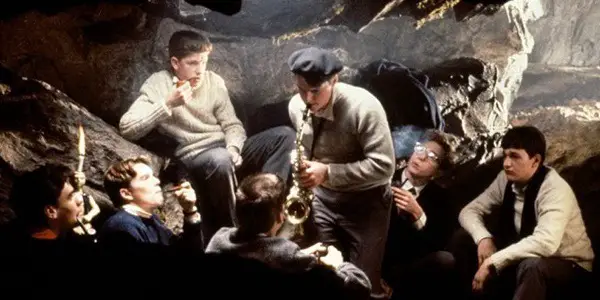
The boys within Keating’s class have been going through the structured institution for years. In Neil’s case, his structured academics does not end with summer break. He is “encouraged” to continue his studies over the summer – get ahead. Yet, he is given no time to breath, relax, or explore. Strict structure, unyielding hard work and obedience are the only paths to success.
Keating, being a graduate of Welton, knows the expectations and traditions – yet he is not what who he was taught to be and is more aware of what the students must be going through. He is the ripple in their lives that breaks them of their traditional shackles by simply encouraging free thinking. While each of the four pillars – tradition, honor, discipline and excellence – are vital to success, they are not the only things that make an individual successful. At one class, he encourages the boys to stand on the teacher’s desk and look around the room. While they are still doing what they are told (obedience), they are seeing the room in a different way.
Everything in the school is regimented and monitored – lunches are structured, there is a curfew of “lights out” and punishments are dished out swiftly. The boys, in some cases, are literally whipped into shape; the principal telling the delinquent to bend over their desk and paddling them. The subjugation of speaking their minds and opposing authority is immediately snuffed out and highly discouraged. This method and way of life has proven successful in the past, and so it will and must continue to do so.
Keating, however, embraced those who defy him, or try to skirt out of their assignments, finding the opportunity to TEACH a lesson rather than BEAT the lesson into the boys. Assigned to write their own poems, one boy makes fun of the assignment by writing a short and snarky poem. Thinking himself clever, Keating quickly points out that he has in fact completed the assignment, elaborating on short poems and how he could improve. Immediately, the defiance against authority has vanquished, yet there is no fear or discouragement. Instead, the student finds loyalty and trust in his teacher.
Artist vs. Free Thinker
One of the biggest takeaways from Dead Poets Society for me was the difference between what makes an individual an artist versus what makes an individual a free thinker. We can all claim that anyone can be an artist – yet can the same be said about a free thinker? We can all master a skill, follow a formula to success, but it is the creativity and freedom of self that opens up a new world of thought and possibility that cannot be achieved by formulaic ways of thinking.
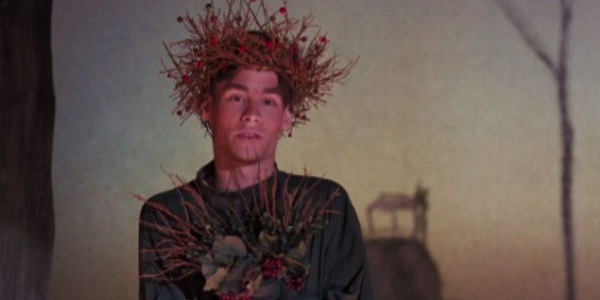
There is not only one way of learning and there is not only one way of measuring one’s smarts and abilities. This is immediately seen when Keating has his students read aloud the introduction to poetry – a dry and formula-based approach that guarantees success and mastery of the art. Boring and monotonous, he has the students remove the introduction, ripping out the pages and leaving only the poems themselves for the students to learn from. They are no longer told what to think but to allow the poems to speak for themselves, as well as open the prospect for unhindered interpretation.
A student writes a poem to mock his poetry assignment only to find that he has broken free from the constraints of the assignment given to him, keeping the elements of what makes a poem but writing what would be least expected. Todd (Ethan Hawke) fears the aspect of public speaking that poetry introduces. Unable to break past his anxiety to reach success, Keating pushes him to break through his fears and master the art. Covering the boy’s eyes, he pushes him to say the first things that come to mind – a flow of consciousness if you will. Even as Keating backs away from him, Todd is able to push past his self-set boundaries and deliver a mesmerizing piece of poetry – and art all his own.
Keating is the personification of a free thinker. He has what he is required to teach (artist) but he teaches the material in a manner differently (free thinker) breaking away from the school’s rigorous and systematic approach. Encouraging the boys to stand on the desk to view the room differently and even calling him “Oh captain my captain” exemplifies his role as a free thinker – and encourages freedom within the boys. Even Shakespeare is broken free of a supposed “right way” to portray his works, Keating displaying that art is free by reciting famous sonnets as Marlon Brando and John Wayne.
The boys take this lesson and begin to expand their minds, a revival of The Dead Poets Society (a secret society created by Keating when he was a student) brought back to life. Here the boys begin their own adventure toward free thinking in a safe and encouraging environment where love and life grows beyond the system. Through Keating and participation in the Dead Poets Society, the boys begin to find their own voice – the voices of free thinkers.
Family
Family is a central part of Dead Poets Society. From the opening ceremony at the beginning of the film, family is the support and driving force in the lives of these boys. Yet, while the biological family is closely in focus within this film, Dead Poets Society also takes a moment to look at the family that we make.
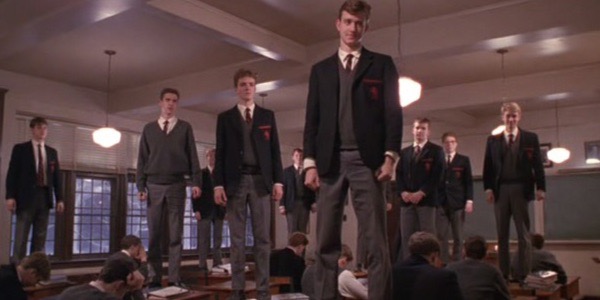
The school itself is a family for each one of the boys. While cold and hard, there are expectations and a form of nurturing. The school is where the boys are day in and day out with only their teachers as parental figures to turn to. They are taught, nurtured, and disciplined as the school sees fit.
The group of boys are also a family unit that is examined, a random meeting of boys whose bond is solidified by the space and time they share. They share in each others’ journeys of love, heartache and adventure. Early on, we see their unified bond as they sneak in a joint during move-in day. As they embrace a world of free thinking, they do it together, resurrecting the Dead Poets Society and encouraging one another to reach further.
The family we are born into is also examined. These boys are the future of the family – both through representation and success. For Neil, his family has sacrificed everything to get him into this school, constantly reminded that he is not to let them down. Every step in his education is carefully laid out, structured and overseen by the patriarch – Neil’s desires and concerns are of no concern. He is to be a doctor, and will be.
As Neil breaks free from the preset standard of expectation set by his father, the feeling of no escape closes in on him. While his parents believe what they have set for their son is in his best interest, Neil is given no freedom and no choice. Acting and the school yearbook, both strong interests of Neil’s, are sacrificed and discarded for further study and for the family.
While there are scenes of mothers crying as they let their sons go, Dead Poets Society is overwhelmingly flooded with images of scenes and moments where the child has been overshadowed and success has become an obsessive goal. The image of the family is the most important and can only be maintained through the success of their children.
Conclusion
With the holiday season winding down and the cold nights continuing on, I highly recommend curling up as a family and watching Dead Poets Society. It is a wholesome film for the whole family that will make you laugh, cry and give you all the right feels – especially as you watch and share one of the best performances from the late and great Robin Williams.
What are your thoughts on Dead Poets Society?
Does content like this matter to you?
Become a Member and support film journalism. Unlock access to all of Film Inquiry`s great articles. Join a community of like-minded readers who are passionate about cinema - get access to our private members Network, give back to independent filmmakers, and more.













